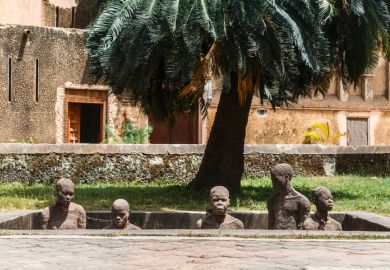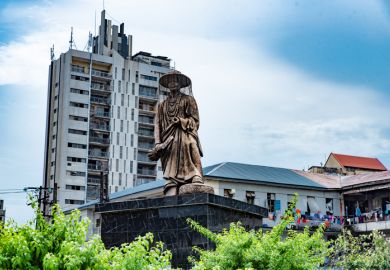Students enrolled on a “groundbreaking” African history master’s programme have been awarded compensation after their lecturer, who started the course in 2017, was made redundant part way through their studies.
The University of Chichester suspended recruitment onto the master’s by research programme in the history of Africa and the African diaspora in July 2023, arguing that it was no longer economically viable. It also made Hakim Adi, believed to be the first historian of African heritage to become a professor of history in the UK, redundant.
A complaint brought by students who were in the middle of the course at the time was taken to the Office of the Independent Adjudicator (OIA) for Higher Education, which has now decided it was “partly justified”, and the university’s claim that it did not guarantee that a specific member of staff would teach students “was unreasonable”. The adjudicator has ordered the university to pay the group an undisclosed sum.
It ruled that 12 of the students had a legitimate expectation to be taught by Adi, adding that the university had advertised the course on the basis that the students would “learn directly” from him, and he had been described by the university as the “only professor of the history of Africa and the African diaspora in Britain”.
A final student, however, was deemed to be on intermission, and was therefore excluded from the remedy. Leigh Day, the law firm representing the students, said it “disagreed” with this, and was considering a judicial review, about which it has advised the OIA.
An OIA report on the incident says: “The course webpage placed particular emphasis on students being able to learn directly from [Adi]. It also emphasised his unique role as the only professor of the history of Africa and the African diaspora in the UK and their expertise in this research area. In this context, we think that the complaint panel’s decision that the university didn’t guarantee students would be taught by a specific staff member isn’t reasonable in all the circumstances.”
The OIA was unable to look at all the grounds of the complaint as other elements were addressed by a judicial review brought by the Black Equity Organisation in 2024.
Jacqueline McKenzie, human rights partner at Leigh Day, said that the ruling was “a significant victory” for the students who were “left in academic limbo” due to the changes to course.
“The decision acknowledges the fundamental principle that students should receive the education they were promised, taught by the experts they signed up to learn from.
“While this ruling is an important step forward, we remain deeply concerned about the circumstances that led to the closure of this groundbreaking course and the impact on those affected.”
She said the firm would “continue to pursue justice for our clients” through the OIA processes and a seperate legal claim alleging discrimination and breach of contract against the university, which has been stayed.
The students are being supported by funds collected via a crowdsourcing campaign which has so far raised more than £7,500.
A University of Chichester spokesperson said: “Like all universities, the University of Chichester periodically reviews its course portfolio in response to enrolment trends and financial pressures.
“The MRes in The History of Africa and The African Diaspora regrettably closed to new applicants in 2023, but we are making every effort to work with continuing students so that they can complete their studies.
“We refute any suggestion of discrimination and note that the OIA claim was only partially upheld on the basis of procedural issues.”
Register to continue
Why register?
- Registration is free and only takes a moment
- Once registered, you can read 3 articles a month
- Sign up for our newsletter
Subscribe
Or subscribe for unlimited access to:
- Unlimited access to news, views, insights & reviews
- Digital editions
- Digital access to THE’s university and college rankings analysis
Already registered or a current subscriber?








